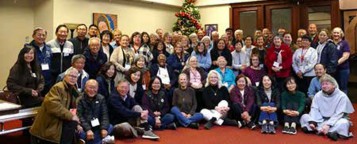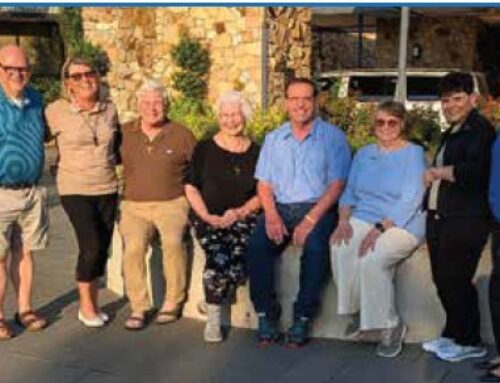(This article originally appeared in the TAU-USA Spring 2025 Issue #115)
Inclusive Multilingual Communication
by Caroline Yandell, OFS
Minister, St. Francis Region
 A common statement that we have all probably heard is, “The United States is a melting pot.” But that doesn’t really seem right if you think of what a melting pot does and what its contents looks like. A melting pot melts down everything in it into one single entity. I picture a glutinous unicolored mass. Not an attractive site at all.
A common statement that we have all probably heard is, “The United States is a melting pot.” But that doesn’t really seem right if you think of what a melting pot does and what its contents looks like. A melting pot melts down everything in it into one single entity. I picture a glutinous unicolored mass. Not an attractive site at all.
A salad bowl seems to be a more appropriate visual for the composition of our nation. A salad has a variety of colors, textures and flavors that come together to make something attractive and beneficial, which is much more like our combination of various cultures, backgrounds and skin tones.
People who reside in the United States come from all over the world, including many of the members of our National Fraternity who come from different cultures and speak many languages other than English. Some were born and raised in the U.S., and others immigrated as children or adults. Some have learned to speak and understand English, and some have not.
In the St. Francis Region in Southern California, almost 40% of the members speak Korean. There are two fraternities of Vietnamese speakers, and two Spanish-speaking fraternities. There is also a fraternity that has a majority of members who speak Tagalog.
This has a great impact on how the region communicates and functions. It impacts how plans are made for such events as regional gatherings, fraternal and pastoral visits, and Chapter.
The current Regional Executive Council (REC) includes members who speak Spanish and Korean. The previous REC also had a Vietnamese speaker. Three regional members act as translators for the region, translating important documents. These include part of the quarterly regional newsletter, documents that are distributed at Chapter, and other regional documents.
At Chapters, translated notes are provided so all attendees are aware of what is being covered in the presentations. All the liturgies include parts spoken, and sometimes sung, in all four languages.
It is evident at the regional picnics that language differences are no barrier to eating, playing and laughing together – especially with all the delicious international food that is shared. Members assist in translating prayers as well as activities when needed. One highlight is when each culture group shares their own version of grace before lunch.
At last year’s regional gathering, the topic was the Stigmata of St. Francis. There were two OFM presenters – one English speaker and one Korean. Everyone gathered for an international potluck lunch, followed by a PowerPoint presentation of various Stigmata pictures set to music. There were pre-translated questions for members to discuss after the PowerPoint.
Working in and with a multicultural, multilingual region takes special planning and translation work. It means getting some tasks done sooner so that the translators have time to get their work completed. These are all challenges that are worth addressing, for it states in our Rule, Art. 19:



Leave A Comment